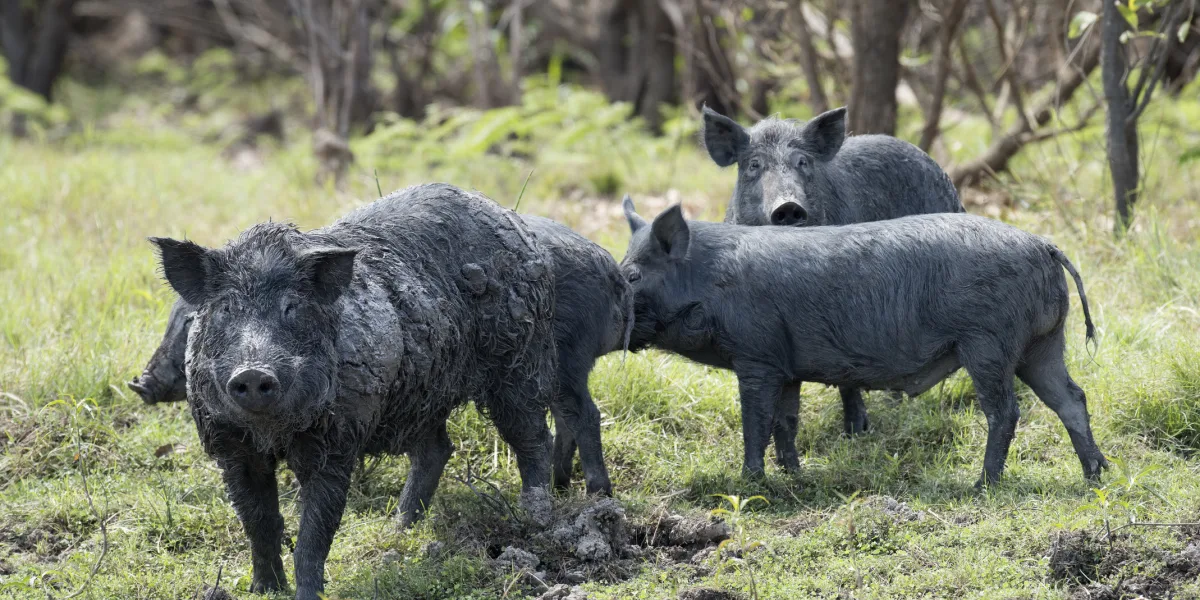We all have a role to play in safeguarding the Limestone Coast from feral pigs
We take feral pig sightings very seriously. Feral pigs have the potential to cause a lot of problems in the Limestone Coast. They eat lambs and other native animals, destroy pastures, native vegetation and wetlands. They also attract illegal hunters, reduce water quality, damage fences and spread diseases.
Once feral pig populations become established they are expensive to eradicate. They have a rapid reproductive rate and their populations quickly get out of control.
Our Landscape Officers work in close partnership with affected landholders to rapidly respond to feral pig outbreaks in the Limestone Coast. Whether you are a farmer, landholder, hunter or community member, we all have a role to play in protecting our region from the impacts of feral pigs.
Be vigilant in protecting your property and our region from feral pigs
Preventing feral pigs from settling on your property can bring significant economic, environmental, and social benefits.
Our Landscape Officers are ready to rapidly respond to feral pig incursions. They'll help by using cameras to confirm sightings, confirm the number of animals and their locations. This information is used to develop an effective control plan.
If you see feral pigs or any signs of them on your property or in the landscape, the critical first step is to report it to us straight away.
Early detection of feral pig incursions is critical
We encourage you to be vigilant in looking for signs of feral pigs on your property. Signs of a feral pigs can include:
- sounds at night
- rooting (diggings)
- fouled waterholes
- tracks or scats
- damage to fencing.
Local Landscape Officers, local knowledge
We have a responsibility to protect the region from feral pig incursions. This is guided by the Limestone Coast Pest Plant and Animal Strategy.
Our Landscape Officers are spread throughout the Limestone Coast. They can work with you to quickly respond to feral pig incursions on your property.
If you have any queries about feral pigs on your property, our local Landscape Officers are here to help.
Contact your local Landscape Officer by calling 08 8429 7550 or find your local Landscape Officer on the below link.
Find your local Landscape Officer
Read the Pest Plant and Animal Strategy today [PDF, 1 MB]
Understanding your responsibilities
Under the Landscape South Australia Act 2019 (the Act), pigs are declared for control. The Act includes separate declarations for domestic (farmed) and feral pigs. Feral pigs are pigs that are not held in captivity.
In the Limestone Coast landholders are responsible for destroying feral pigs on their land under section 192(1) of the Act.
All domestic pigs in South Australia are considered livestock. This includes farmed, hobby farmed, and pet pigs. They must be tagged and confined to prevent escape and to distinguish them from feral pigs.
Properties with one or more domestic pigs must be registered with the Department for Primary Industries and Regions (PIRSA) and have a Property Identification Code (PIC). More details on enclosure and identification requirements for keeping pigs can be found on the PIRSA website.
Under the Act, significant penalties are imposed for the movement, sale, possession, and release of pigs into the landscape. Fines of up to $125,000 or imprisonment for two years for individuals can apply.
